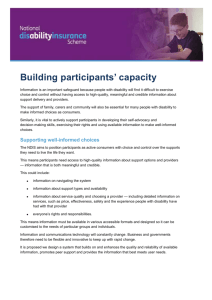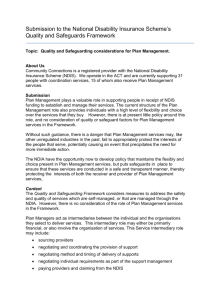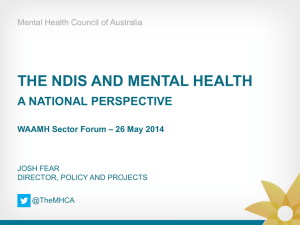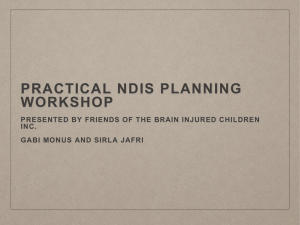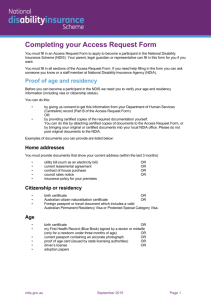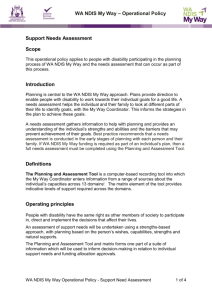Do you think the current system is fair, equitable, and flexible?
advertisement
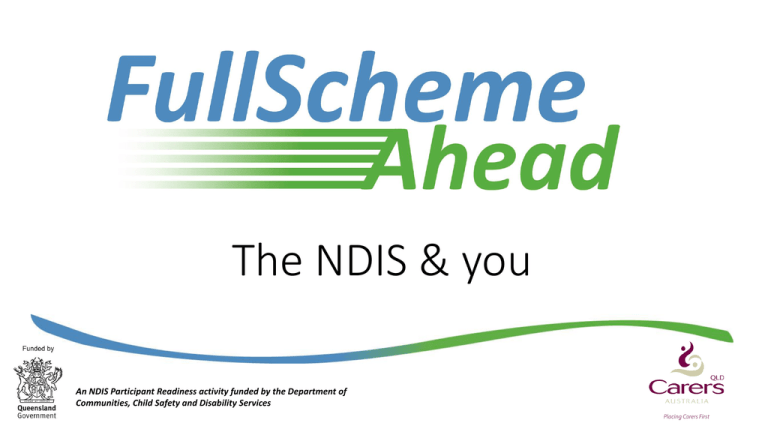
The NDIS & you An NDIS Participant Readiness activity funded by the Department of Communities, Child Safety and Disability Services Do you think the current system is fair, equitable, and flexible? “…underfunded, unfair, fragmented, and inefficient, and gives people with a disability little choice and no certainty of access to appropriate supports.” And…Dr Bruce Bonyhady, Chair of the NDIA Board, agrees http://www.abc.net.au/news/2014-07-09/national-pressclub-bruce-bonyhady/5585104 What’s in a name? Insurance, really! You do not have to pay to be part of the NDIS! …and again, Dr Bruce Bonyhady explain it best http://www.abc.net.au/news/2014-07-09/national-pressclub-bruce-bonyhady/5585104 Don’t glaze over…we are just getting started Starts July 2016 Around 97,000 Queenslanders to receive NDIS supports, currently 45,000 National and state-based existing services and supports will continue Eligible people will be phased in to NDIS Please explain? The individual with a disability is at the heart of the NDIS Eligible people will be assessed for a package of support Each participant will have a plan Individualised plans are tailored to the persons goals, personal circumstances and support needs The plan is for now and the future Who’s eligible? Must meet 3 requirements: 1. Permanent and significant disability that affects their ability to take part in everyday activities 2. Under 65 years of age when they first access the NDIS 3. Australian citizen, a permanent resident, or New Zealand citizen who is a Protected Special Category Visa holder Complete My Access Checker (ndis.gov.au/myaccess-checker) Assessment & planning process Time frames vary according to individual circumstances Participant will be sent Planning Workbook to assist in identifying : Goals and aspirations (written, words, pictures, videos…) Existing supports [formal (paid) and informal (unpaid)] • formal supports are reasonable and necessary Important relationships • a “nominee” selected by the person with a disability Reasonable and necessary supports A reasonable and necessary supports must: relate to the person’s disability not include day-to-day living costs that are not related to a participant’s disability support needs represent value for money be likely to be effective and beneficial to the participant take into account informal supports from families, carers, networks, community… • Very important that the planner understands what your caring role encompasses so the supports adequately meet the participant’s and your needs http://www.ndis.gov.au/people-disability/videos-stories-quotes-and-cameos-0#4 Types of supports Aimed to increase independence Transport, workplace help, equipment & aids, household help, training, supports to sustain informal supports Supports to sustain informal supports Nature, extent, frequency of your caring role What do you want or need to keep providing the same level of care? Have a say…choice & control, self-direction or self-management Choice & control over how supports are provided how they are used who will provide the support Self-direction: the individual will decide how planned supports services are used, such as choosing who provides supports - a carer may guide and assist Self-management: the individual or nominee manages the funds received to pay for planned supports services supports Ways to manage NDIS funding Different depending on individual circumstances Different options can be chosen for different supports Self-managed by the participant A Plan “nominee” manages the supports Registered plan management provider The National Disability Insurance Agency (NDIA) Combination Impact on pensions and allowances Disability Support Pension will not be affected by participating in the NDIS Mobility Allowance will cease once NDIS plan begins. The NDIS will provide reasonable and necessary transport assistance. Carer payment and allowance will only be affected if the NDIS plan substantially changes the care arrangements, to the extent that the carer is no longer eligible under Centrelink criteria Participating in the scheme does not directly affect Carer Payment and Carer Allowance in the way that the Mobility Allowance is directly affected. In a nutshell 1. Check eligibility 3 requirements 2. Apply to the NDIA (or wait to be contacted directly) No referral needed Walk into an NDIA office Ring 1800 800 110 Visit www.ndis.gov.au 3. Complete the NDIS planning & assessment Process Workbook Participant (or NDIA) may nominate a person to assist Meetings with NDIS planner - as many as it takes Explain your caring role 4. Implement plan

